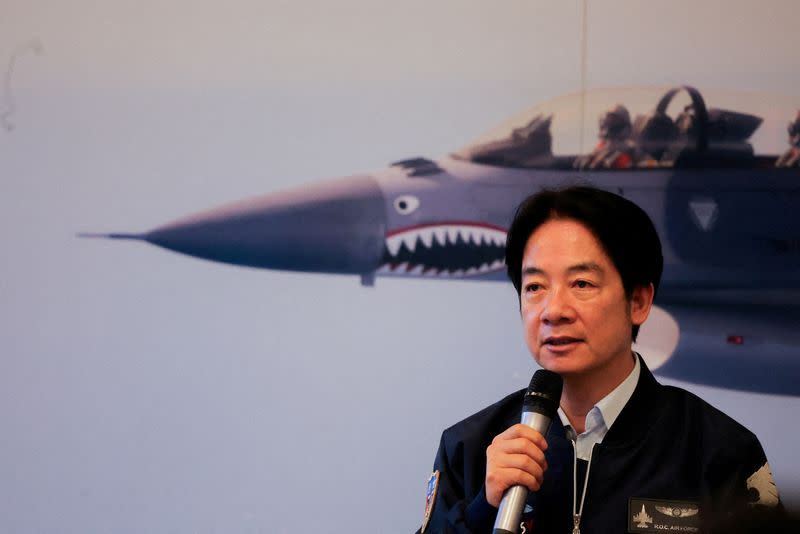The few can beat the many, Taiwan president says ahead of annual war games

By Ben Blanchard
TAIPEI (Reuters) - There are many examples in history of smaller militaries beating larger opponents, Taiwan President Lai Ching-te told air force officers in comments released on Tuesday, offering encouragement ahead of annual war games being held later this month.
China, which views democratically governed Taiwan as its territory, has been staging regular exercises around the island for four years to pressure Taipei to accept Beijing's claim of sovereignty, despite Taiwan's strong objections.
Taiwan's armed forces are dwarfed by those of China's.
But Taiwan has been modernising the military not only with new equipment like submarines but championing the idea of "asymmetric warfare", to make its forces more mobile and hard to attack, with for example vehicle-mounted missiles and drones.
Lai, wearing camouflaged military fatigues and taking questions in front of a Taiwan-made Ching-kuo Indigenous Defence Fighter at an air base in central Taiwan, said military strength is not a simple mathematical question of addition and subtraction.
"The amount of equipment admittedly is important, but it cannot represent the military power of a country," Lai said, in video footage released by his office.
"In history, there are many cases where the few win out over the many, and there are countless ways to win over old-fashioned enemies with new thinking."
A senior Taiwan official said last month that this year's annual Han Kuang drills will be as close as possible to actual combat, no longer just putting on a show to score points but aiming to simulate real fighting given a rapidly rising "enemy threat" from China.
Taiwan starts its five-day Han Kuang exercises on July 22, alongside the Wan An civil defence drills where cities are briefly shut down during simulated air raids.
China held two days of its own war games around the island shortly after Lai took office in May, saying it was "punishment" for his inauguration speech, which Beijing denounced as being full of separatist content.
Lai rejects Beijing's sovereignty claims and says only Taiwan's people can decide their future. He has repeatedly offered talks but been rebuffed by China.
"The peace we want is a peace with a solid foundation, a true peace that must be established by our own strength," Lai said at the Taichung air base.
China has previously said it is futile for Taiwan to think it can use arms to prevent "reunification".
Asked by a fighter pilot whether Taiwan was giving people a wrong impression it was preparing for war with its focus on defence self-sufficiency, Lai said he wanted peace.
"Some people may have such misgivings but everyone knows we are a peace loving country," he said. "But the peace we want is a 'true peace' that has a solid foundation and is established by our own strength."
(Reporting by Ben Blanchard; Additional reporting by Roger Tung)


